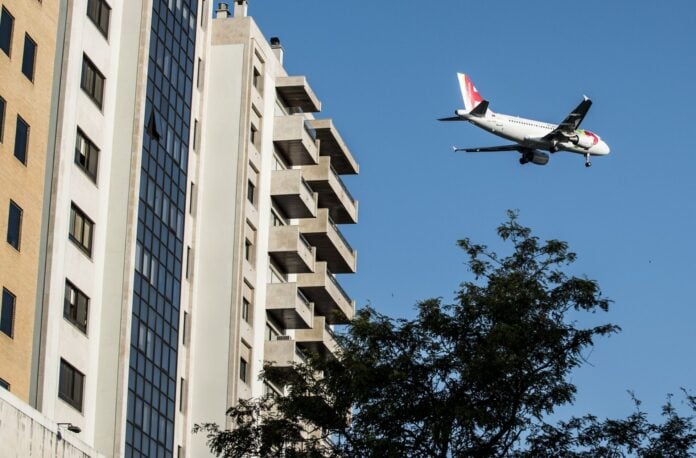Government neatly side-steps issues relating to noise/ air pollution
Portugal’s minister for infrastructure and housing, Miguel Pinto Luz, has said today that NAV Portugal has guaranteed that it has the capacity to increase the current 38 flight movements at Lisbon’s airports per hour to 50.
“NAV Portugal (the country’s air traffic control company) is in a position to increase its capacity to handle up to 50 movements per hour (at Lisbon airports – Lisbon, Cascais and Montijo),” he told parliament
According to Lusa, the minister was referring to a guarantee given by NAV – the air traffic service provider – in a memorandum in response to a government request which was signed by three NAV directors, including the chairman, Pedro Ângelo, and sent to the ministry on May 3.
Pinto Luz was responding to questions from Socialist MP Hugo Costa about the government’s announcement on Tuesday that it will increase the capacity of Lisbon’s main Humberto Delgado Airport to 45 movements per hour.
Costa, like PS leader, Pedro Nuno Santos, have asked the minister what studies he was basing the decision to increase capacity on, pointing out that the Independent Technical Commission that carried out the strategic environmental assessment of the new airport ruled out increasing the number of flights at Humberto Delgado.
The minister emphasised that the government “doesn’t take decisions lightly” and said “the person who made this decision (NAV, so not technically one person)” was not someone he appointed.
NAV’s new system for reorganising air traffic over Lisbon, Point Merge, which can reduce delays, went into operation this week after negotiations with the Air Force and an investment of €2 million, writes Lusa.
“Although it hopes that the new system will contribute to reducing delays at Lisbon airport, NAV has emphasised that this does not only depend on airspace, but on infrastructure, pointing out that in 2023, the contribution of air traffic control to flight delays was just 10%.
“The Point Merge system was only tested for Lisbon and was being worked on at a time when a dual airport solution” Humberto Delgado + Montijo “was envisaged, in order to gradually increase the capacity of the Lisbon airport system from 44 to 72 movements per hour (46 in Lisbon, two in Cascais and 24 in Montijo)”, concludes Lusa.
All of this however sidesteps the very alarming report, published in 2019, outlining the kind of health effects flight movements at Lisbon’s airport have on the immediate population.
The report, for example, concluded that people who “work, live or spend any form of prolonged period of time” near Lisbon’s Humberto Delgado airport “are exposed to high concentrations of ultrafine particles of such magnitude that constitutes a considerable risk to their health”.
Lead investigator Margarida Lopes – who developed the study within the Sciences Technology and Environmental Engineering Faculty of the New University of Lisbon- explained that some of these particles are “700 times less dense than a strand of hair”, yet they can precipitate problems that range from “neurological disorders to fetal development and cognitive problems in children”.
The report came out in the context that the government and ANA at the time were pushing for the construction of the new airport at Montijo air base, located in yet another high-density residential area.
The ‘nanoparticles’ were found to float about within a radius of at least one km, and they were particularly found on airplane descent paths in busy commercial areas like Amoreiras.
Lopes was quoted as saying that “until a few years ago, no one even suspected that particles so minuscule could have such a large impact on health”. Their measurement – and recognition of their prejudicial effects on public health – is “recent” and there is a “growing preoccupation, due to their direct absorption by the body, through the respiratory system”.
Nanoscience is very new, TSF Rádio concluded in its text on the study, and while it is now clear that these particles affect people’s health, “there is still no law setting limits on levels of exposure”.
Five years on, and there still isn’t.
PS Socialists on Lisbon City Council appear only too aware of the consequences of further flights over Lisbon on residents’ health.
Talking to TSF Rádio this week, Inês Drummond, one of the party’s councillors, said PS members have received the news that the government is preparing to authorise an increase in the number of planes per hour at Humberto Delgado with “extreme concern”.
The plan represents a 20% increase in flights in a city “that is already massacred, suffering a lot from noise and pollution” – and, this far, the ‘silence’ on the subject on the part of Lisbon’s (PSD) mayor Carlos Moedas has been “deafening”.
“It is unacceptable, and incomprehensible”, Drummond told TSF – suggesting the subject cannot simply be one ‘logistically settled by NAV’.




















